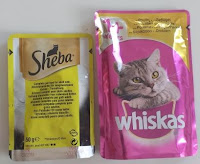 |
| Thiamine is included in all commercial cat food |
The Association
of American Feed Control Officials is an organisation behind the
regulation of pet food in America. They give guidelines to pet food
manufactures when they are formulating a recipe for pet food of what ingredients
and nutrients are required within the food and how they should label the
product.
A vitamin named Thiamine
(vitamin B1) is a very
important vitamin that needs to be included in all types of pet food. According to the Association of American Feed
Control Officials your cat needs to ingest 5 mg of thiamine per kilogram
of cat food eaten.
Thiamine is one of those vitamins that can
come in a synthetic form or a natural form. One of the aims of The Association of American
Feed Control Officials is to ensure that the right percentage of
Thiamine is included in commercial pet food to ensure your cat is getting its
required essential carbohydrates. In most cases, your cat does get its correct
percentage but there can be instances where this is not the case.
How is Thiamine Taken In?
Cats need to take
in Thiamine from their diet as they cannot produce it internally. If too much
Thiamine is taken in from their diet, then any excess thiamine that is not used is
usually excreted in their urine.
Adding Thiamine to Your Cat's Diet
Not giving your
cat commercial cat food and only preparing them homemade cat food means that
your cat is not getting the correct amount of thiamine required in their diet to
keep them healthy. If you do decide to not feed your cat commercial cat food,
then you can only provide them a diet that has been specially formulated by a certified
veterinary nutritionist.
It is imperative
that you ensure that the wet cat food that you are feeding your cat contains
the correct percentage of thiamine. This is not always easy to predict as pet
food manufacturers don’t always list percentages or portions of Thiamine
on packages of commercial cat food.
Since commercial cat
food is usually the cats’ main source of food, it is important that you take
any action if you think that your cat is suffering from a Thiamine deficiency.
Effects of a Thiamine Deficiency
Since it is hard to know exactly how commercial pet food is
produced and prepared in each factory, then there is the chance that the
percentage of thiamine required by your cat in its diet is not present within
the commercial cat food that you are feeding it.
If your cat starts to lose weight, become lethargic, starts
having any bowel issues or starts losing its appetite, then this could all be symptoms that your cat has a thiamine deficiency. It has also been known to cause
neurological issues in your cat like a head tilt, circling, an abnormal gait and lack
of coordination. The worst case scenario in the case of a lack of Thiamine is
heart failure in your cat.
Treatment
If you suspect your cat has a Thiamine deficiency then bring
it to your veterinarian. They will do a physical and an MRI to see if there has
been any impact to the brain. Once it has been determined that your cat is
lacking in Thiamine, they will be given an injection of Thiamine and a
prescription of oral supplements that they will have to take until their body
starts to show signs of improvement. Their cat food will most likely have to be
changed and your veterinarian will manage their treatment going forward to
ensure that no deficiency occurs again in the future.
Comments
Post a Comment